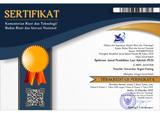The Relationship Between Self-Confidence and Entrepreneurial Motivation of Graduates of Sewing Training Participants at UPTD BLK Payakumbuh
 ),
), (1) Universitas Negeri Padang
(2) Universitas Negeri Padang
 Corresponding Author
Corresponding Author
DOI : https://doi.org/10.24036/spektrumpls.v12i1.127640
Full Text:
 Language : en
Language : en
Abstract
The background of this research by the low entrepreneurial motivation of graduates participating in sewing training at UPTD BLK Payakumbuh, this was due to the self-confidence of the graduate participants. This research aims to reveal a picture of self-confidence, entrepreneurial motivation, and the relationship between self-confidence and entrepreneurial motivation of graduates of sewing training participants at UPTD BLK Payakumbuh. This research is a correlational type of quantitative research. The population in this study was 32 graduates participating in sewing training. The sampling technique uses proportional random sampling. The sample was taken as 21% of the population, namely 25 graduates participating in sewing training. The data collection technique uses a questionnaire. The data analysis technique uses presentation formulas and the Sprearman Rho correlation formula. The results of this study show: 1) the self-confidence of sewing training graduates is relatively low; 2) the entrepreneurial motivation of sewing training participants is low; 3) there is a significant relationship between self-confidence and entrepreneurial motivation of graduates of sewing training participants at UPTD BLK Payakumbuh.Suggestions in this research are expected for graduate training participants. It is hoped that graduate participants will always try to raise their self-confidence and enthusiasm to be motivated in starting a business so that the skills and knowledge gained during the sewing training can be developed.
Keywords: Self-confidence, Entrepreneurial Motivation
References
Asiyah, A., Walid, A., & Kusumah, R. G. T. (2019). Pengaruh Rasa Percaya Diri Terhadap Motivasi Berprestasi Siswa pada Mata Pelajaran IPA the Effect of Self Confidence Towards Students’ Motivation for Achievements in Science Lesson. Scholaria: Jurnal Pendidikan Dan Kebudayaan, 9(3).
Aulia, L. A.-A., Kelly, E., & Zuhri, A. S. (2022). Dukungan Keluarga dalam Meningkatkan Motivasi Belajar Siswa. Psikostudia: Jurnal Psikologi, 11(4).
Aziz, A., & Basri, B. (2017). Hubungan Antara Kompetensi Guru dan Kepercayaan Diri dengan Kemandirian Siswa SMPN 2 Pangkalan Susut. Jurnal Psychomutiara, 1(1).
Hadiyati, H., & Fatkhurahman, F. (2021). Dampak Kepercayaan Diri Mahasiswa Berwirausaha Melalui Lingkungan Keluarga dan Kemandirian. INOBIS: Jurnal Inovasi Bisnis Dan Manajemen Indonesia, 05(01).
Harahap, M. T. K., & Setiawati, S. (2023). Empowerment of Poor Communities through Information Technology Based Entrepreneurship Training in Padang Sarai Village, Koto Tangah District, Padang City. KOLOKIUM: Jurnal Pendidikan Luar Sekolah, 11(3), 952–959. https://doi.org/10.24036/kolokium.v11i3.774
Hasibuan, M. S. . (2011). Manajemen Sumber Daya Manusia. Bumi Aksara.
Iga, W. (2017). Kecenderungan Kualitas Rasa Percaya diri Siswa kelas V SD Negeri 2 Sukseda. Buleleng.Mimbar PGSD, 5(2).
Komala, B. K., & Mujiasih, E. (2019). Gambaran Kepercayaan Diri Berwirausaha Pada Mahasiswa Fakultas Ekonomika dan Bisnis Jurusan Manajemen Angkatan 2016 Universitas Diponegoro. Jurnal EMPATI, 8(1).
Koranti, K. (2016). Analisis Pengaruh Faktor Eksternal dan Internal Terhadap Minat Berwirausaha. Proceeding PESAT (Psikologi, Ekonomi, Sastra, Arsitektur & Teknik Sipil).
Kurniawan, A., Khafid, M., & Pujiati, A. (2016). Pengaruh Lingkungan Keluarga, Motivasi, dan Kepribadian Terhadap Minat Wirausaha Melalui Self Efficacy. Journal of Economic Education, 5(1).
Mantik, J. C., Tewal, B., & Dotulong, L. (2020). Analisis Faktor-Faktor yang Mempengaruhi Motivasi Berwirausaha Pada Pengusaha Kecil di Kota Manado. Jurnal EMBA, 8(4).
Rahim, A., & Yusnan, M. (2022). Pengaruh Kemandirian dan Motivasi Belajar Siswa Terhadap Pendidikan Karakter di Madrasah Ibtidaiyah Al Ikhlas Uwemagari Kabupaten Buton Selatan. Jurnal Pendidikan Rokania, 7(1).
Rajab, S. (2022). Pengaruh Kepercayaan Diri Mahasiswa Terhadap Dorongan Berwirausaha. Jurnal Bisnis Kompetif, 1(2).
Ratnawati, D., & Kuswardani, I. (2015). Kematangan vokasional dan Motivasi Berwirausaha pada Siswa Sekolah Menengah Kejuruan (SMK). Universitas Setiabudi Jakarta.
Rivendri, R. (2023). Training and Training Based on Field Training Model (Internship). KOLOKIUM: Jurnal Pendidikan Luar Sekolah, 11(3), 1105–1112. https://doi.org/10.24036/kolokium.v11i3.760
Setiyono, J., & Sutrimah, S. (2016). Analisis Teks dan Konteks Pada Iklan Operator Seluler (Xl dengan Kartu As). Jurnal Pedagogia, 5(2).
Slameto, S. (2010). Belajar dan Faktor-Faktor yang Mempengaruhinya. Rineka Cipta.
Sugiyono, S. (2016). Metode Penelitian Kuantitatif, Kualitatif, dan Kombinasi (Mixed Methods). Alfabeta.
Susiana, A. (2023). Empowerment of Poor Communities through Information Technology Based Entrepreneurship Training at Nagari Aia Manggih Utara Youth Center, Lubuk Sikaping District, Pasaman Regency. KOLOKIUM: Jurnal Pendidikan Luar Sekolah, 11(3), 1125–1133. https://doi.org/10.24036/kolokium.v11i3.763
Yusuf, A. M. (2016). Metode Penelitian Kuantitatif, Kualitatif & Penelitian Gabungan. Prenadamedia.
 Article Metrics
Article Metrics
 Abstract Views : 103 times
Abstract Views : 103 times
 PDF Downloaded : 31 times
PDF Downloaded : 31 times
Refbacks
- There are currently no refbacks.

This work is licensed under a Creative Commons Attribution-NonCommercial 4.0 International License.



